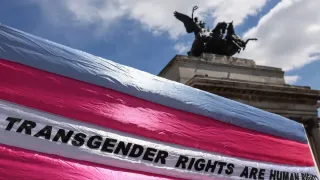
3 hours ago
Judge Finds Florida GOP Congressman Cory Mills a Danger to Women After Miss United States Seeks Protection
READ TIME: 3 MIN.
Florida Congressman Cory Mills, a Republican known for his vocal opposition to transgender rights, was found by a judge to pose a danger to women following a high-profile court battle with Lindsey Langston, the current Miss United States and a Republican state committeewoman. The judge’s ruling, handed down in Columbia County, Florida, came after Langston accused Mills of repeated threats, harassment, and the potential release of intimate images, often referred to as “revenge porn” .
Court documents reveal that Langston reported Mills to the Columbia County Sheriff’s Office in July after their relationship ended, alleging that Mills threatened to release nude images and videos of her, as well as recordings of their sexual encounters . “I panicked. I immediately knew what videos he was referencing,” Langston testified, describing the fear and reputational harm the threat posed .
The relationship between Mills and Langston began in 2021, with the couple living together for several years. According to Langston, she left Mills after learning of another woman’s assault allegation against him at his Washington, D.C. residence, though that accusation was later withdrawn .
After reviewing evidence and testimony, the judge issued a restraining order in favor of Langston and described Mills as a “danger to women,” underscoring the seriousness of the allegations and the risk posed by the Congressman’s behavior . The ruling specifically cited Mills’ direct and indirect threats, the pattern of harassment, and the potential for reputational and emotional harm to Langston and potentially others .
This restraining order comes amid growing national scrutiny of elected officials’ conduct and the need for accountability, particularly as it relates to the safety and dignity of women and marginalized groups.
Mills has garnered national attention for his outspoken opposition to transgender rights, aligning himself with efforts to restrict access to gender-affirming care and to limit trans participation in sports and public life . His rhetoric has been widely criticized by LGBTQ+ advocates, who argue that anti-transgender legislation and public statements contribute to a hostile environment for transgender people and other marginalized communities.
The judge’s findings in this case have fueled calls from LGBTQ+ organizations for greater scrutiny of lawmakers who promote anti-transgender policies while engaging in conduct that endangers women or other vulnerable groups. Advocates point out that there is a broader pattern of political leaders using rhetoric about “protecting women” while simultaneously being accused of behavior that undermines women’s safety .
Mills has denied all wrongdoing and claims the allegations were misconstrued or politically motivated. In public comments, he stated, “The idea that if she’s at risk or there’s a threat that’s being made, you would go to the cops” . Langston, however, testified that she repeatedly asked Mills to stop contacting her and detailed the distress caused by his threats .
During the hearing, Langston was asked under oath if Mills had ever physically harmed her. She replied, “Not yet. He has made a statement to me about being physically aggressive with someone, pushing them in a stairwell” .
The case has prompted reactions from national women’s rights and LGBTQ+ advocacy groups. Organizations such as the Human Rights Campaign and National Center for Transgender Equality have cited the Mills case as further evidence of the importance of holding public officials accountable and ensuring that those who espouse “protection of women” do not engage in conduct that contradicts their stated values .
Many LGBTQ+ advocates also highlight the intersectionality of the issue, as transgender women and nonbinary people often face compounded risks of intimate partner violence, online harassment, and legal vulnerability. The case underscores the need for inclusive legal protections and comprehensive support services for all survivors, regardless of gender identity .
In the aftermath of the ruling, there have been calls for congressional investigation and possible censure of Mills. House Resolution 676, introduced to censure Mills for an unrelated alleged assault incident, has gained renewed attention as lawmakers weigh their responsibilities in responding to misconduct among their ranks .
As the legal process continues, both the political and advocacy communities are closely monitoring the case for its implications on the standards of conduct expected from elected officials, as well as the ongoing struggle for women’s and LGBTQ+ safety.






